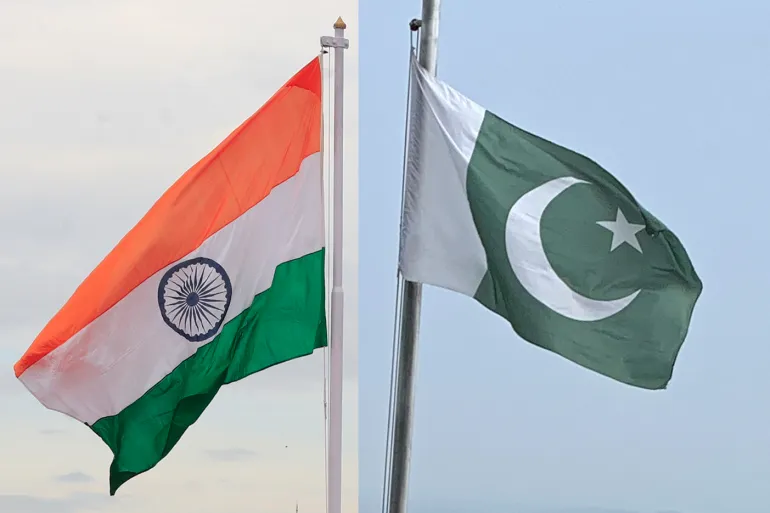
Indo-Pak: From rivalry to partnership in South Asia By Dr Zafar Khan Safdar
DUE to their differing perspectives on national interests, Pakistan and India, two major countries in South Asia, have been marked by persistent uncertainty and ambiguity largely due to India’s approach to national interests. India’s strategic rivalry with Pakistan is evident in its inconsistent and often unproductive actions, which contribute significantly to the ongoing political-security conflict between the two nations. This dynamic, characterized by mutual mistrust, has hindered the development of constructive and cooperative ties. Pakistan, on the other hand, has consistently sought to engage as a good neighbour, aiming to foster better relations despite India’s reluctance. India’s inability to move past historical grievances and its approach to policy-making have created barriers to positive political, strategic and economic interactions, reinforcing a perception of Pakistan as a rival rather than a partner.
The two nations that emerged from the partition of British India, share a complex and fraught history marked by deep-seated mistrust. Pakistan, from its inception, embraced a non-violent and peaceful approach to nation-building. In contrast, India, with its secular and predominantly Hindu-majoritarian ideology, has faced criticism over its contentious control of Jammu and Kashmir. The legacy of colonialism further exacerbated tensions, as the partition left unresolved issues such as the division of capital and the separation of civil and military administrations.
Today, Pakistan-India relations are characterized by geopolitical rivalries, resource limitations, energy shortages and ongoing territorial disputes. India, grappling with a significant portion of its population living below the poverty line and experiencing low human development, seems to struggle with prioritizing poverty alleviation, regional peace and economic collaboration with its neighbours. This state of affairs underscores the challenges both nations face in moving towards a more stable and prosperous relationship.
Over the past 77 years, Pakistan and India have endured three wars and numerous crises within a shared neighbourhood marked by deep-seated mistrust and hostility. Despite various agreements and peace talks, India’s retreat from negotiations has exacerbated mutual distrust. The persistent inability to reach a consensus on security and peace has impeded regional socioeconomic development. A major point of contention remains the dispute over Jammu and Kashmir, a region India holds in contravention of the partition conditions established at the end of British India. India ignored UNSC resolutions from 1948 to 1957 and proposed a UN-sponsored referendum to determine Kashmir’s political future. Yet, despite wars, peace efforts and recent changes under the Modi Administration, such as revoking the region’s special autonomy, reconfiguring it into separate Union Territories of Jammu & Kashmir and Ladakh and stripping it of statehood, the Kashmir issue remains unresolved.
India’s approach to the conflict, driven by the RSS’s ambition to transform India into a Hindu State, seeks to alter the contested region’s status and boundaries. The US’s investment in India’s military and economic capabilities has emboldened the Modi Administration, while the global community has largely refrained from criticizing India’s actions in Kashmir, likely to safeguard their economic interests in the Indian market. Despite India’s stated desire for peace, its antagonistic stance towards Pakistan has stalled SAARC’s progress, potentially leading other South Asian nations to unite in an effort to counterbalance India’s influence.
Pakistan faces a considerable challenge in its bilateral relations with India due to persistent cross-border terrorism. For decades, Pakistan has struggled with terrorism originating from beyond its borders. Since 2001, India has utilized Afghan territory to exert pressure on Pakistan, investing $3 billion in Afghan infrastructure and training Afghan soldiers. India has also been involved in supporting and training groups like ISSI/TTP and orchestrating terrorist activities aimed at destabilizing Pakistan and disrupting China-Pakistan relations. Indian Consulates along the border have reportedly been used as bases for such operations. In contrast, Pakistan’s interest in Afghanistan is centred on fostering a peaceful, stable and friendly neighbour. To this end, Pakistan has engaged in proactive diplomacy. Meanwhile, India, seeking to expand its influence since the 9/11 attacks, has pursued a strategy of military build-up and tactical interference in the region.
For India and Pakistan to improve their bilateral relations, India must reconsider its perception of Pakistan as strategic adversary and adopt a more cooperative stance. Developing economic cooperation and enhancing bilateral trade can create mutual dependencies that encourage collaboration. Maintaining cordial and constructive relations is essential for achieving lasting security and development in the region. Both countries need to focus on building trust, emphasizing their shared interests and creating an environment conducive to cooperation.
The most strategically involved foreign powers in South Asia are China and the United States, whose contributions to economic integration and crisis management influence both nations’ approaches to tense situations and future potential for economic integration. Responses from the US and China to crises, as the Pulwama-Balakot crisis in 2019, have the potential to escalate tensions and affect both nations’ behaviour. The China-Pakistan Economic Corridor and the Belt and Road Initiative (BRI) by Beijing offer a route for connectivity in ‘one of the least integrated’ regions of the globe, while the US’s Indo-Pacific Economic Framework (IPEF) is criticised for being unauthoritative and non-inclusive. Avoiding partisanship and putting geopolitical rivalry at bay are crucial for addressing India-Pakistan conflicts. Their involvement in South Asia should promote de-escalation and may focus on issues of global concern like non-traditional security challenges and climate change, as well as growing interconnectedness.
To prevent nuclear conflict, it is crucial that India adopts a strategic stability regime and moves away from its aggressive security doctrines. Pakistan, committed to peace, has consistently advocated for addressing non-state actors and terrorism through formalized processes, despite challenges posed by Indian-sponsored groups. The Indus Basin Treaty should be leveraged to resolve water-related disputes and India should take proactive steps to bridge the trust deficit it has perpetuated. Encouraging economic cooperation and trade would be beneficial for developing shared interests.
—The writer is PhD in Political Science and visiting faculty member at QAU Islamabad.
(zafarkhansafdar@yahoo.com)
Indo-Pak: From rivalry to partnership in South Asia By Dr Zafar Khan Safdar
Source: https://pakobserver.net/indo-pak-from-rivalry-to-partnership-in-south-asia/


